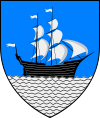Râmnicelu, Brăila
Râmnicelu | |
|---|---|
 Location in Brăila County | |
| Coordinates: 45°17′N 27°32′E / 45.283°N 27.533°E | |
| Country | Romania |
| County | Brăila |
| Government | |
| • Mayor (2020–2024) | Lucian Chiru (PSD) |
Area | 23.2 km2 (9.0 sq mi) |
| Population (2021-12-01)[1] | 1,846 |
| • Density | 80/km2 (210/sq mi) |
| Time zone | EET/EEST (UTC+2/+3) |
| Postal code | 817110 |
| Vehicle reg. | BR |
| Website | www |
Râmnicelu is a commune located in Brăila County, Muntenia, Romania. It has four villages: Boarca, Constantinești, Mihail Kogălniceanu (formerly Domnița), and Râmnicelu.
The commune is situated in the upper reaches of the Bărăgan Plain. It lies on both banks of the Buzău River, with Râmnicelu on the southern side and the three other villages on the northern side, connected by a bridge in Boarca.
Râmnicelu is located in the northwestern part of the county, 25 km (16 mi) north of the town of Ianca and 35 km (22 mi) west of the county seat, the city of Brăila. County road DJ221, which runs from Brăila to Iancu, passes through Râmnicelu village.
Its neighbors are the following communes: Scorțaru Nou to the northeast, Gemenele to the east, Movila Miresii to the south, Șuțești to the southwest, and Racovița to the west and northwest.
At the 2011 census, 86.11% of inhabitants were Romanians and 11.57% Roma.
It was in Ion Sion, part of Râmnicelu, that on 10 August 1951, Romania's hottest temperature on record, 44.5 °C (112.1 °F), was observed.[2][3]
Much of the phreatic zone under Râmnicelu is contaminated with nitrates and nitrites, which are chemicals that cannot be eliminated by boiling the water from wells.[4]
Notes
- ^ "Populaţia rezidentă după grupa de vârstă, pe județe și municipii, orașe, comune, la 1 decembrie 2021" (XLS). National Institute of Statistics.
- ^ (in Romanian) "44 de grade la Calafat, record absolut de temperatură pentru iulie" Mediafax, 24 July 2007
- ^ THERMAL EXTREMES Archived 9 September 2008 at the Wayback Machine Administrația Națională de Meteorologie
- ^ Iacob, Bianca (October 21, 2021). "Bem apă otrăvită cu substanțe care nu se distrug nici prin fierbere. Cum ajunge mizeria din adâncuri pe mesele românilor". Observator (in Romanian). Retrieved December 5, 2021.



